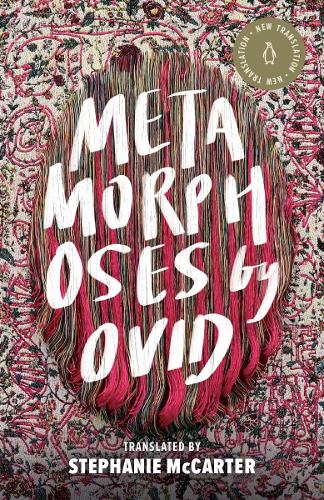
Metamorphoses
(Hardback)
Available Formats
Paperback, New edition
Published: 1st January 2005
Hardback
Published: 28th May 2014
Paperback
Published: 14th April 2004
Hardback
Published: 24th September 2010
Paperback
Published: 24th September 2010
Hardback
Published: 10th January 2023
Paperback
Published: 19th December 2013
Paperback
Published: 6th February 2024
Publishing Details
Metamorphoses
By (Author) Ovid
Translated by Stephanie McCarter
Introduction by Stephanie McCarter
Notes by Stephanie McCarter
Penguin Putnam Inc
Penguin USA
10th January 2023
13th April 2023
United States
Classifications
Physical Properties
Hardback
544
Width 162mm, Height 237mm, Spine 43mm
864g
Description
The first female translator of the epic into English in over sixty years,Stephanie McCarter addresses accuracy in translation and its representation of women, gendered dynamics of power, and sexual violence in Ovid's classic. A Penguin Classic Hardcover Ovid's Metamorphoses is an epic poem, but one that upturns almost every convention. There is no main hero, no central conflict, and no sustained objective. What it is about (power, defiance, art, love, abuse, grief, rape, war, beauty, and so on) is as changeable as the beings that inhabit its pages. The sustained thread is power and how it transforms us, both those of us who have it and those of us who do not. For those who are brutalized and traumatized, transformation is often the outward manifestation of their trauma. A beautiful virgin is caught in the gaze of someone more powerful who rapes or tries to rape them, and they ultimately are turned into a tree or a lake or a stone or a bird. The victim's objectification is clear- They are first a visual object, then a sexual object, and finally simply an object. Around 50 of the epic's tales involve rape or attempted rape of women. Past translations have obscured or mitigated Ovid's language so that rape appears to be consensual sex. Through her translation, McCarter considers the responsibility of handling sexual and social dynamics. Then why continue to read Ovid McCarter proposes Ovid should be read because he gives us stories through which we can better explore ourselves and our world, and he illuminates problems that humans have been grappling with for millennia. Careful translation of rape and the body allows readers to see Ovid's nuances clearly and to better appreciate how ideas about sexuality, beauty, and gender are constructed over time. This is especially important since so many of our own ideas about these phenomena are themselves undergoing rapid metamorphosis, and Ovid can help us see and understand this progression. The Metamorphoses holds up a kaleidoscopic lens to the modern world, one that offers us the opportunity to reflect on contemporary discussions about gender, sexuality, race, violence, art, and identity.
Reviews
McCarter confronts the tricky issues associated with both the poet and his epic not only in her forthright introduction but in the translation itself, where, like an art restorer removing decades of browned varnish from an Old Master, she strips away a number of inaccuracies and embellishments that have accreted in translations over the decades and centuries, obscuring the sense of certain passages, particularly those portraying women and sexual violence McCarters translation reproduces Ovids speed and clarity. Even better, she is alert to many of the sparkling verbal effects for which the poet was famous in his own time If you didnt know she was writing about the concerns of someone who died twenty centuries ago, youd think her subject was still alive.
Daniel Mendelsohn, The New Yorker
The Metamorphoses has it all: sex, death, love, violence, gods, mortals, monsters, nymphs, all the great forces, human and natural. With this vital new translation, Stephanie McCarter has not only updated Ovid's epic of transformation for the modern ear and era --- she's done something far more powerful. She's paid rigorous attention to the language of the original and brought to us its ferocity, its sensuality, its beauty, its wit, showing us how we are changed, by time, by violence, by love, by stories, and especially by power. Here is Ovid, in McCarter's masterful hands, refreshed, renewed, and pulsing with life.
Nina MacLaughlin, author of Wake, Siren: Ovid Resung
Stephanie McCarters gorgeous verse translation of the Metamorphoses is ground-breaking not just in its refreshingly accessible approach to Ovids syntax and formal devices but for how she reframes the controversial subjects that have made Ovid, and Ovidian scholarship, so fraught for contemporary readers. McCarters translation understands that the Metamorphoses is a complex study of power and desire, and the dehumanizing ways that power asserts itself through and on a variety of bodies. McCarters deft, musical, and forthright translation returns much needed nuance to Ovids tropes of violence and change, demonstrating to a new generation of readers how our identities are always in flux, while reminding us all of the Metamorphoses enduring relevance.
Paisley Rekdal, author of Nightingale
Author Bio
Stephanie McCarter is Professor of Classical Literature at the University of the South in Sewanee. She has published translated work on Horace and has written for Sewanee Review, Eidolon, Electric Literature and The Millions.
